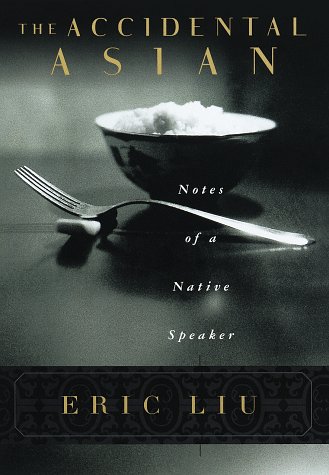What is race for? That bracing question animates every page of The Accidental Asian, a powerful work from one
of the nation's leading young voices. In these personal and poignant reflections on assimilation,
Eric Liu articulates a vision of American identity that will provoke and inspire. For Liu, the price of
assimilation became clear when he tried to read a memorial book about his father's life, composed in Chinese,
and found himself staring at a blur of indecipherable characters. There in his hands was the measure of his
inheritance. Liu, meanwhile, has watched with both wonder and concern as a pan-ethnic Asian American
identity has taken shape. Here now is a race that offers a new source of roots--but also tightens the hold that
color has upon our minds.
Like so many in the second generation, Liu doesn't know whether to embrace, resist, or redefine assimilation--
and ends up doing all three at once. He speaks candidly about his journey from a fierce pursuit of racelessness to a slow
rapprochement with race. He is not afraid to reveal his ambivalence. At bottom, Liu is an "accidental Asian"--someone who has stumbled upon a sense of race, who is not always sure what to do with it.
Weaving narrative and analysis into a series of elegant essays, Liu addresses a broad range of questions:
¸ Is whiteness America's fundamental race problem?
¸ Are Asian Americans really the New Jews?
¸ Should we fear the rising might of China?
¸ What does a journey through Chinatown
reveal about our own lives?
¸ What might intermarriage mean for Asian
Americans--and for the future of race itself?
The clear voice in these pages will resonate with Americans of every hue. Beyond black and white, conservative and liberal,
native and alien, lies a vast and fertile field of human experience. It is this field that Liu, with insight and compassion, invites us to explore.
As a second-generation Chinese-American, Eric Liu has grown up with an awkward relationship to race and ethnic identity. He can follow a conversation in Chinese, although he would have problems if he tried to take part in it; as for the written language, he is functionally illiterate. He would be the first person to question which of his personality traits are "Chinese" or "American," "Asian" or "white," or none of the above, and
The Accidental Asian is, in fact, a rigorous self-examination--not merely about the costs and benefits of assimilation, but about whether assimilation should even be viewed in those terms.
Whether he's recalling his adolescent frustration with "Chinese hair" that just wouldn't permit itself to be styled, examining the history of Chinatown, or pondering the mixture of fear and fascination with which China is viewed by Americans, Liu writes with admirable personal intensity. It doesn't matter whether you consider The Accidental Asian to be a memoir or a batch of interconnected essays; once you've read it, you will be forced to consider for yourself what place, if any, race has in America today (but even more so tomorrow).
![]()
